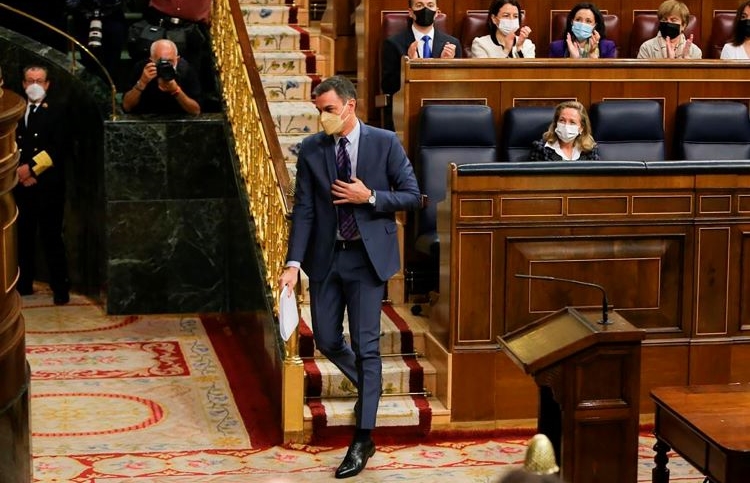Eduardo González
The President of the Government, Pedro Sánchez, faced yesterday the firm opposition of all the parliamentary groups, including his allies and partners (and with the well-known exception of the PSOE), to his decision to support the Moroccan autonomy plan for Western Sahara, a “real policy and with a sense of State” whose objective is to favor “stability, prosperity and security” of the whole of Spain and “of two autonomous cities as important as Ceuta and Melilla”.
“There has been much talk in recent days of a turn in the relationship with the Government’s position in Morocco,” said the head of the Executive during his announced appearance before the Congress of Deputies to explain his decision to modify Spain’s traditional position with respect to its former colony. “Rather, I would say that we must speak of a further step on a path that began 14 years ago, when the Spanish government welcomed the Moroccan proposal for autonomy as a valuable contribution to overcoming a conflict, let us not deceive ourselves, which has been going on for more than four decades,” he continued.
“There is neither disinterest nor disregard for the suffering of the Saharawi people, what there is is a firm intention to contribute to the overcoming of a conflict that has been going on for half a century and with no prospect of resolution, at least up to that time. And all this within the framework of the United Nations and with the agreement of the parties directly involved”, he assured.
“In my letter to King Mohammed VI, I recognized the importance of the Western Sahara issue for Morocco and the serious and credible efforts that Morocco, within the framework of the United Nations, is making to find a mutually acceptable solution” and “I added that, in this regard, Spain considers the Moroccan proposal for autonomy presented in 2007 as the most serious, credible and realistic basis for the resolution of this dispute,” Pedro Sánchez recalled.
“It is a position aligned with that of our European partners and many other countries,” he assured. “France has been supporting Morocco’s proposal for years. Germany has recently given its support, precisely through a letter sent by the President of the German Republic to the King of Morocco last January, as I did a few weeks ago. The European Commission, the High Representative and Vice-President of the European Union, has expressed its support for the position expressed by the Spanish Government. The United States has also recognized that Morocco’s plan is serious, credible and realistic. And that is the position logically expressed by the Biden Administration,” he continued.
“I would also like to recall that this is a clear position, but it is not new with respect to the positions that have been expressed by previous governments in Spain,” he stated. “Spain had already recognized the Autonomy Plan in 2007, when it was presented precisely by the Moroccan authorities to the then President (José Luis Rodríguez) Zapatero,” he assured. “In the joint declarations adopted in the high-level meetings between the Government of Spain and the Government of Morocco, held in Morocco under the presidency of Mariano Rajoy, in 2012 and in 2015, Morocco’s efforts were recognized and any reference to the right to self-determination disappeared,” he added.
In this regard, Rajoy himself offered this past Monday – during a conference at the European University of Madrid – his first statements on the decision of Sanchez, in which he criticized the form (“we have learned that Spain is changing its policy in the Sahara, after 45 years, by a letter sent to the Moroccan King and not through the desired channels”) but did not pronounce himself on the substance or on his alleged support for the autonomy plan.
According to Pedro Sánchez, the government has “reaffirmed and deepened” its position on Western Sahara “precisely now that a new window of opportunity has just opened to resume negotiations” thanks to the appointment, last October, of “a new personal envoy of the UN Secretary General for Western Sahara, Staffan de Mistura, who has renewed precisely the hope that these negotiations can be resumed, after two years without the appointment of a new special envoy”, he added.
Relations with Morocco and Ceuta and Melilla
The will of the Government, he assured, is “to establish with Morocco the relations that correspond to two neighboring countries, with so much strategic importance in the field of migration control, economic and commercial relations, also in the fight against terrorism”. “What we are going to do is to guarantee a secure territory with a border capable of ensuring compliance with the control of people and goods”, he said “An inter-ministerial group has been formed to propose scenarios, options for reopening the borders, including a protocol that defines the criteria for entry into Spanish territory and ensures safe and fluid traffic”, he continued. The Minister of Foreign Affairs, José Manuel Albares, “is going to travel this Friday to Rabat to implement the road map that consolidates this new relationship,” he recalled.
Likewise, he assured, “we are going to reinforce the mobilization and the commitment of the State with Ceuta and Melilla”. “Special plans are being drawn up within the mandate set by the National Security Strategy, with the participation of all the institutions, of the entire associative fabric of these two autonomous cities, and this plan, logically, will be accompanied by national economic resources and from the European Union’s recovery funds,” he continued. “I was in Ceuta and Melilla last May 2021, after the massive arrival of irregular immigrants in very few hours in Ceuta. Last March 23 I had the opportunity to return and I did so with a solution to the problems we were facing,” he recalled.
“I claim, therefore, ladies and gentlemen, the path we have taken, which is that of real politics, that of a sense of State, that of stability, prosperity and security of our country and also of two autonomous cities as important as Ceuta and Melilla”, declared Sánchez, without providing further details on the possible counterparts of Morocco regarding the sovereignty of these two localities.
Cuca Gamarra: “Trying to close one crisis, he has provoked three”
As Albares himself could already experience during his appearance last week before Congress, the Government (and the PSOE, the majority partner of the Executive) has been left absolutely alone in defending this historic volte-face of Spanish foreign policy, a “turn behind Parliament’s back” that has meant “the rupture of 47 years of consensual policy” with respect to the Sahara, “one of the few issues on which all the groups shared the same position”, affirmed the general coordinator of the PP and spokesperson of the Popular Group in Congress, Cuca Gamarra.
According to Gamarra, in its attempt to solve the “worst crisis in decades” with Morocco, the Government has provoked “three crises, one with Algeria, another with its government partners and the third with the Parliament”. “That is, trying to close one crisis, it has provoked three. This is very difficult to overcome,” he insisted. “When all Western countries are looking for reliable energy suppliers, you have weakened our relationship Algeria,” a “partner and friend of Spain” and main gas supplier to our country, he warned. “What has happened does not come at the best time. It is nonsense,” said the PP deputy, who asked Sánchez if Morocco “has given him any guarantee about Ceuta, Melilla and the Canary Islands,” because “territorial integrity is not the same for Spain as it is for Morocco.”
For his part, the leader of Vox, Santiago Abascal, was particularly belligerent with Pedro Sanchez, whom he described as “an autocrat who acts outside Congress, his own government partners, the Spanish people and their voters”, and who declared that the letter of “submission” sent to Morocco “is a fucking insult” to the Parliament.
Echenique and Rufián compare Mohammed VI with Putin
The spokesman of Unidas Podemos (minority partner of the Government), Pablo Echenique, criticized harshly, although “with all loyalty”, this turn of the Government “very difficult to justify”, and affirmed that there are only two positions regarding Western Sahara: the defense of “self-determination, which is the position of the UN, of Unidas Podemos and that which appears in the program of the PSOE”, or that of (former US President) Donald Trump”, that of Morocco (“an authoritarian regime that violates the human rights of a people, as Russia does with the invasion of Ukraine”) and, “now also unfortunately, that of Spain”. Several deputies of Unidas Podemos subsequently participated in a rally near the Congress against the decision of the Government, among them the delegate of the Polisario Front in Spain, Abdulah Arabi, who attended the appearance of Sanchez from the tribune of guests.
For his part, the spokesman of ERC, Gabriel Rufian, accused the government of having “abandoned” the Saharawi people and of having “exchanged principles for more Moroccan control at the fence of Ceuta and Melilla”. “Why are tanks sent to a tyrant like Putin and instead letters are sent to another tyrant like Mohammed VI, who has plundered the Sahara in the last 40 years?” he asked.







